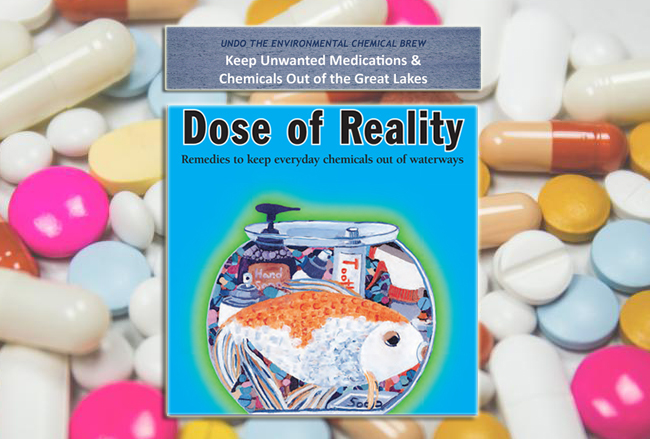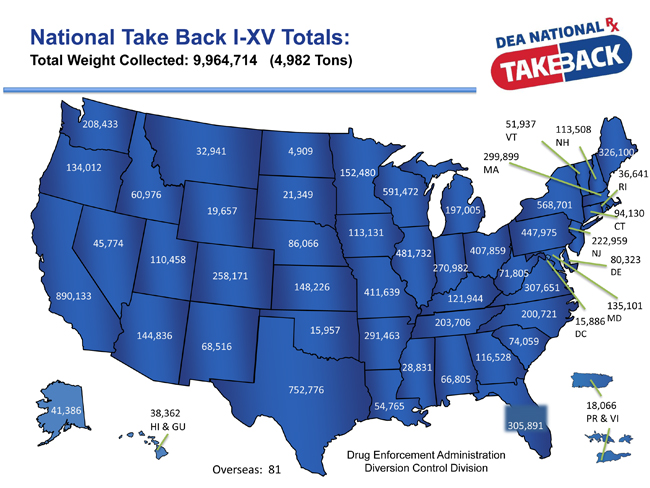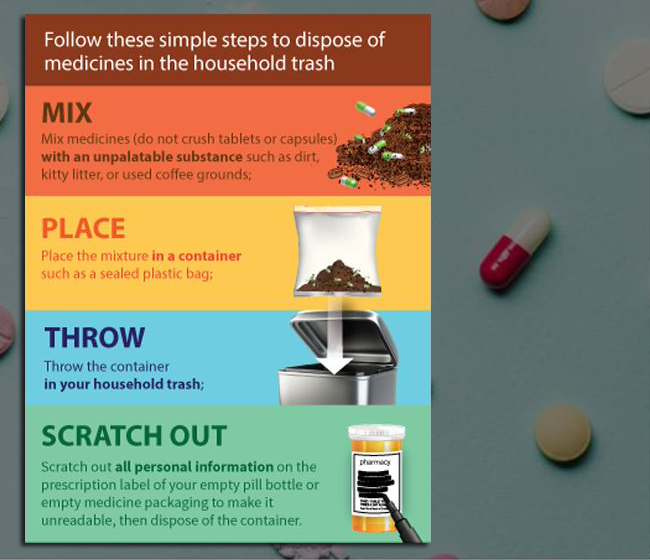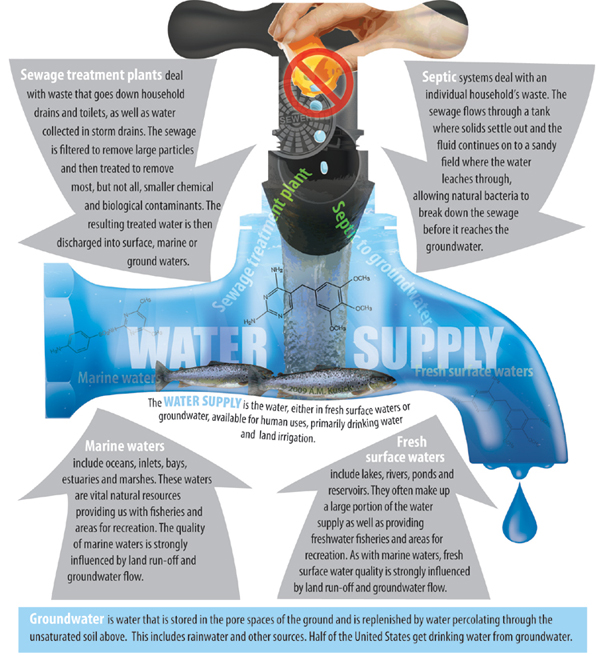Contact:
Helen Domske, New York Sea Grant's Coastal Education Specialist, P: 716.645.3610, E: hmd4@cornell.edu
Buffalo, NY, October 22, 2018 - New York Sea Grant (NYSG) is encouraging
the public to take expired, unused and unwanted pharmaceuticals to
designated retail and law enforcement agency locations on the 16th National Take Back Day, to be held October 27, 2018 from 10 am to 2 pm.
This federally-designated day for collection of waste pharmaceuticals
prevents the entry of such products as antibiotics, blood pressure
regulators, pain medications, tranquilizers, and hormones, into state
waterways and drinking supply sources.
“Proper disposal of unused medications is critically important to
protect the public drinking water supply and the Great Lakes ecosystem.
Take Back Day sites accepting these pharmaceuticals provide easily
accessible drop-off points so everyone can do their part to protect New
York’s waters,” says NYSG Coastal Education Specialist Helen Domske. Domske is also the Associate Director of the Great Lakes Program at the State University of New York's University at Buffalo.
To find a 2018 National Prescription Drug Take Back Day authorized collection site, visit the U.S. DEA National Take Back Day Initiative Web site.
New York Sea Grant offers "Return Unwanted Medicines"
resources, which include information about the impact of keeping
pharmaceuticals and personal care products (PPCP) out of the Great Lakes
and other water sources. This information is well summarized in the
‘Undo the Environmental Chemical Brew: Keep Unwanted Medications and
Chemicals Out of the Great Lakes’ guide developed by NYSG. The guide
lists 17 different types of PPCPs, including antibiotics, hormones,
contraceptives, antidepressants, cosmetics, and vitamins, that are
finding their way into the Great Lakes, the source of drinking water for
42 million people in the United States and Canada.

In addition to its "Return Unwanted Medicines" resources, NYSG also offers a number of other "Green Tips for Coastal Living" via its Web site.
Results are soon expected from a two-year NYSG-funded
research project to examine the effectiveness of advanced water
treatment options, environmental levels and the potential effects of
pharmaceuticals in New York waters.
“Research is increasing our understanding of the impact of bioactive
chemical substances on the aquatic food web," said Domske." For example,
research has recently documented the presence of antidepressants and
their metabolites as well as antihistamines in fish such as largemouth
bass, yellow perch, walleye and steelhead trout in the Niagara River.
Although researchers believe the levels do not pose a threat to humans
eating the fish, they are problematic and one of the reasons we do not
want people to flush medicines down the toilet or drain.”
Earlier this year, the New York State Department of Environmental
Conservation announced a $2 million Pilot Pharmaceutical Take-Back
initiative that officially began in April 2018 with pharmacies,
hospitals, long-term care facilities and other sites participating in
the collection and proper disposal of the unwanted, unused
pharmaceuticals. Learn more at on.ny.gov/rxpilot.

National Prescription Drug Take Back Days take place twice a year, in
the spring and fall. According to the federal Drug Enforcement Agency, a total of 949,046 pounds (or some 474.5 tons) of expired, unused, and
unwanted prescription drugs were amassed by some 5,842 collection sites nationwide during the Spring 2018 National
Prescription Drug Take Back Day. This record-setting collection, when added to the amounts from the 14 prior national collection days, adds up to 9,964,714 pounds (4,982 tons) of medicines brought in through the program.
This initiative addresses a vital public safety and public health issue.
Medicines that languish in home cabinets are highly susceptible to
diversion, misuse and abuse. Additionally, Americans are now advised
that their usual methods for disposing of unused medicines—flushing them
down the toilet or throwing them in the trash—both pose potential
safety and health hazards.

If no medicine take-back programs or
DEA-authorized collectors are available in your area, and there are no
specific disposal instructions on the label, the U.S. FDA says you can
also follow these simple steps to dispose of most medicines in the
household trash. More information can be found via FDA's "Disposal of Unused Medicines: What You Should Know" Web site.

More Info: New York Sea Grant
New York Sea Grant (NYSG), a cooperative program of Cornell University
and the State University of New York (SUNY), is one of 33 university-based
programs under the National Oceanic and Atmospheric Administration’s
National Sea Grant College Program.
Since 1971, NYSG has represented a statewide network of integrated
research, education and extension services promoting coastal community
economic vitality, environmental sustainability and citizen awareness
and understanding about the State’s marine and Great Lakes resources.
Through NYSG’s efforts, the combined talents of university scientists
and extension specialists help develop and transfer science-based
information to many coastal user groups—businesses and industries,
federal, state and local government decision-makers and agency managers,
educators, the media and the interested public.
The program maintains Great Lakes offices at Cornell University, SUNY
Buffalo, SUNY Oswego and the Wayne County Cooperative Extension office
in Newark. In the State's marine waters, NYSG has offices at Stony Brook
University in Long Island, Brooklyn College and Cornell Cooperative
Extension in NYC and Kingston in the Hudson Valley.
For updates on Sea Grant activities: www.nyseagrant.org has RSS, Facebook, Twitter, and YouTube links. NYSG offers a free e-list sign up via www.nyseagrant.org/nycoastlines for its flagship publication, NY Coastlines/Currents, which is published quarterly. Our program also produces an occasional e-newsletter,"NOAA Sea Grant's Social Media Review," via its blog, www.nyseagrant.org/blog.